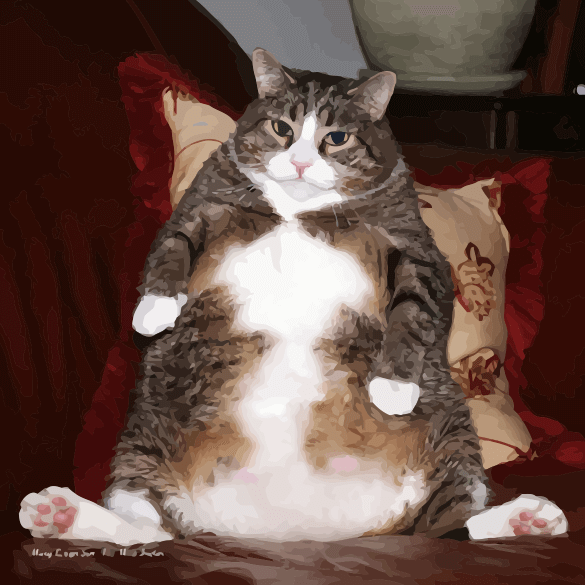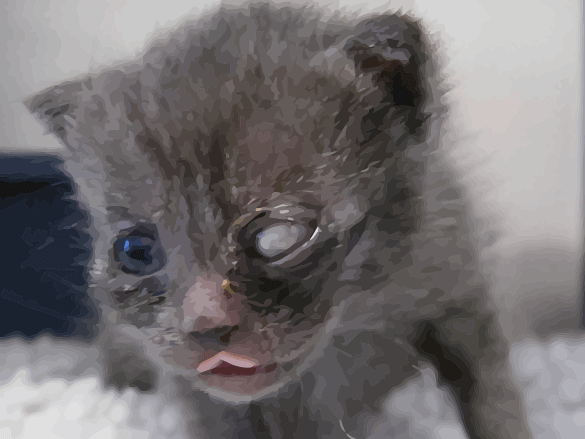Warning Signs of a Sick Cat
Table of Contents
Cats can get sick too. Believe it or not they are not much different when it comes to illnesses and diseases than humans. They have the same organs as other mammals and this makes them susceptible to some of the same diseases. For example, cats can get diabetes, liver damage, heart disease, high blood pressure, cataracts, tooth decay, kidney failure, epilepsy, and arthritis.
Typically, ailments don't happen until your cat ages, but others can happen at any time. For example, a cat can get the flu and colds just like us. In addition, they can become sick from parasites and fungi, as well as all sorts of infections.
How To Reduce The Risk Of Illness

- Allow kittens to breast feed from their mothers. This will ensure proper nutrition plus a healthy dose of antibodies from the mother. Breastfeeding should continue for at least three months.
- Keep sick cats separate from healthy cats especially when they are young. This will reduce the chance of contagious diseases being spread around.
- Make sure you cat gets all prescribed immunizations.
- Take your cat to the vet for regular check-ups. This should be done at least once a year or more often if your cat has already been diagnosed with something.
- Feed your cat only food designed specifically formulate for cats. It's so tempting to give human food, but this can seriously harm your cat, especially carbohydrates or fat-laden foods.
- Do not overfeed your cat. Cats can also become over weight making them more prone to weight related diseases, such as sore joints, diabetes, high blood pressure, etc.
- If you want to give your cat treats make sure they are specifically for cats and appropriate for their age. Also, give them sparingly. They are treats after all and not not meals.
- Change the litter regularly and wash the litter box about once per week. If you have more than one cat each one should have their own litter box. This will reduce the chance of pathogens from their feces getting stuck on their paws and claws.
- If your cat goes outside you need to regularly check for fleas and ticks.
Similar to humans cats will show regular and consistent behavior. When a cat is not feeling well this behavior may change. It's up to you as their owner to pick up on the warning signs that something is wrong.
Things To Regularly Check For
- Runny nose, watery eyes or excessive sneezing. This can be an indication of cat flu or a cold. See below for more information.
- Excessive scratching may indicate a skin condition or fleas.
- Bald spots or excessive fur loss may indicate ringworm or another type of skin fungus.
- Dirty ears. At first this may not be a problem, but if not cleaned properly the ears can become infected.
- Limping while walking or trouble jumping. Either of these can indicate an injury.
- Less playful, more aggressive, or more withdrawn. This means something is bothering them. Obviously they can't tell you what they feel so you should take them to the vet if this abnormal behavior persists for more than a couple of days.
- Loss of appetite. At first try a different cat food just in case they're being finicky. However, if it persists then there might be an underlying condition which a vet will need to diagnose.
- Weight loss even when the same amount of food is being consumer. This may indicate worms, intestinal parasites, or some type of metabolic condition.
- Excessive thirst which persists for more than a few days. This may indicate diabetes.
- Diarrhea or vomiting. If it's only once it's usually not a problem. But if it continues for more than a couple of days you need to take them to the vet. Clearly something is wrong with their digestive system. However, the immediate concern will be dehydration.
- Excessive licking of the genital areas. This may indicate a urinary tract infection. The attention of a vet is needed.
- Cats spend a lot of time grooming themselves, especially after a meal. If you notice that they stop doing this something may be bothering them.
Pay special attention to kittens as their immune systems are weak and they are in close contact with their siblings, making the chance of contracting an illness much greater. They are extremely prone to cat flu which can kill them and eye infections which can leave them blind.
Cat Flu
This is basically an upper respiratory viral infection which can be caused by the Feline Herpes Virus or by the less serious but more common Feline Calicivirus.
Cat flu is very contagious and infects the throat, sinuses, nose, and eyes. The two major warning signs of cat flu are sneezing with discharge and swollen red eyes with a yellowish discharge.
 Blind In One Eye From Feline Chlamydophilosis
Blind In One Eye From Feline ChlamydophilosisFeline Chlamydophilosis
This is an eye infection that starts off as watery eyes, then a clear discharge, and then a yellowish discharge. If it progresses even more the eyes will become glued shut and they will fill with puss from the bacterial infection. Most adult cats can fight off the infection but they should be taken to a vet for a proper diagnosis and medication. In cats with a suppressed immune system this infection is much more serious.
Kittens are more prone to this disease and it is quite common for it to spread to other kittens in the litter. Even more susceptible are cats that have not been breastfeed long enough, as they will lack antibodies.
Luckily a specific type of eye antibiotic is all that is needed to destroy this bacteria, but it needs to be given quickly, before irreversible eye damage occurs.
When in doubt always consult a veterinarian. Besides saving you money from the disease or illness becoming worse, it could save your cat from a lot of suffering.




When you stated that excessive thirst could indicate a cat is experiencing diabetes, I recall watching my cat recently and noticing how often it asks for water now. I thought this was just something that all cats do, but my fellow cat owners all remarked that this is very strange behavior. Now that I know what this could mean, I'll look for a veterinarian in the area that can assist me in getting my cat checked.
I believe that my cat is sick because she has a runny nose. Maybe I'll take her to an animal hospital since she's less playful than before. Thanks for adding that her loss of appetite is a sign of her illness, so I hope that the veterinarian solves this.
Thanks for pointing out that a cat already has the flu if they are having a yellowish discharge while sneezing a lot. I guess I need to take my cat to the vet because of the yellowish discharge that I saw in him when I woke up after a nap. I guess he got it when he went out to wee while there was little drizzles of rain.
I have a kitten who has the same illness please let me know what helps and how I can cure this at home the vet has waiting list that is unreasonable.
thanks so much